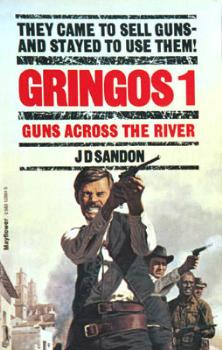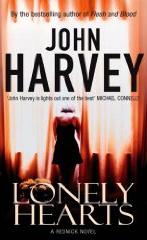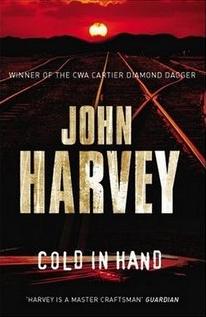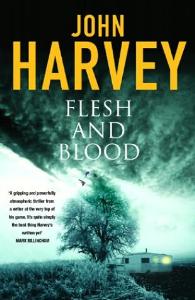|
JOHN HARVEY
is one of the best known, and best-loved, British
crime writers, though he also has a strong following in the US
and on the continent. His latest book is Far
Cry and Bob Cartwright caught up
with John while he was touring the UK
to promote the new book. Predictably, the meeting
took place in Charlie Resnick’s old stamping ground, Nottingham.
Bob:
I was surprised to read in
your biography that
you were actually born in London. I suppose, like most
people, I have always associated you with Nottingham. Are there any more
surprises lurking in your early life? When, for instance, were you
bitten by
the writing bug?
It’s odd, this. I
remember always buying little
notebooks when I was a kid, but not writing much in them; and then,
when I was
at secondary school and at college I set up or edited newspaper, so if
I was
going to be any kind of a writer, it would have been a journalist, but
that
never happened. I recall starting to learn shorthand once and just not
getting
it at all, so maybe that was why it never happened. By then
I’d started
teaching – that was in the mid-60s – and, a few
articles for education
magazines, and some seriously bad poetry aside – I
didn’t write anything until
the mid-70s, when, under Laurence Jame’s tutelage, I wrote
the first of two
biker books for New English Library.
Bob:
I
think it’s fair to say you
came to prominence in 1989 with
the publication of Lonely Hearts, the first in the Resnick series.
However,
your career as a writer started well before that with some crime
fiction, but
with a much greater output westerns and a couple of war books. Can you
tell us
a bit about those early efforts?
As I’ve suggested,
the late Laurence James, who had
been at Goldsmiths’ College with me in the early 60s, and had
gone on to be an
editor at New English Library before becoming a writer, was the main
influence
here. Laurence knew I was looking for a change from teaching and
suggested I
try my hand at writing; NEL wanted another ‘Mick
Norman’ biker book from him,
but he’d moved on to other things, so he recommended me in
his place and ‘Thom
Ryder’ was born – for two books, anyway.

After that, mostly in tandem
with either Laurence
or another editor-turned-writer, Angus Wells, I wrote some forty or so
westerns
under a batch of shared pen names, along with some fairly desperate
attempts to
turn out convincing paperbacks about mercenaries or bands of soldiers.
I had
more luck with teenage romances!
The thing about that period,
which lasted, I
suppose, for no more than five or six years, is that, because I was
writing
roughly 50,000 words a month, I got in an awful lot of practice
– and was being
paid to do so. And I think the most important thing I learned
– though I still
couldn’t pin it down in words – was how to get
readers to turn the page.
Something about pacing and rhythm and narrative expectation.
Bob:
How
did you come to
focus on crime fiction? I imagine you must have made that choice before
realizing that the Resnick series were going to be so successful.
Well, I’d tried
earlier, with four books about a
private eye called Scott Mitchell, which were pretty unsuccessful, and,
a few
other desultory efforts aside, I didn’t think about writing
crime seriously
till the late 80s, when I sat down with the writer Dulan Barber [also,
like
Laurence and Angus, now dead, Dulan wrote crime fiction as David
Fletcher and
horror as Owen Brookes] to think about the character who became Charlie
Resnick. I’d just finished working on TV series called Hard Cases, which was set in Nottingham, where I was then
living, and was about the probation service, with a multi-narrative
story line
very much modeled on Hill Street Blues.
This, and the fact that I’d been reading and enjoying a lot
of Elmore Leonard,
made me want to have another crack at crime fiction –
hopefully, using the pace
of those American models but in a recognisable English setting.
Bob:
I’m
probably being a tad
conservative but of all your crime fiction characters Charlie remains
my
favourite. I am sure you’ve been asked this hundreds of
times, but how did you
come up with a detective of Polish origin, based in London with a fondness for
modern jazz?
I think you mean Nottingham. I was very aware that
there was quite a large Polish population in the city, mostly families
who’d
come over around the time of WW2, and I liked the idea of Resnick
having that
background – then, because he would have been brought up in
Nottingham, he
would know it well yet be, in some respects, an outsider. The deli
sandwiches
sprang from that and so, less obviously, did the jazz. They were both
ways of
signaling that he was a little different from the usual home-grown
cops, and
had a quite rich appetite for music and food. Plus, I’ve
always liked to write
about jazz whenever I could – even back in the early days,
one of my
mercenaries, as a kid, had trailed Charlie Parker all round New York, surreptitiously
recording every note he played.

Bob:
Incidentally,
out of the
three characters – Resnick, Elder and Grayson –
which is your favourite? And
which one was the easiest to write for?
Well, Resnick was and is, if
only because I’ve
written about him so much; with both Frank Elder and Will Grayson,
I’ve been
able to write about the parent-child thing, which, as an older father,
has been
something of a preoccupation in the past ten years.
Bob:
Again,
an old chestnut
of a question, how do your plots materialize? Just to give it a bit of
new spin
to what extent do the different heroes generate different kinds of
plots?
It varies, but to hark back to
the previous answer,
Frank Elder came out of a short story called, I think, “Drive
North”, in which
Elder and his wife and early teenage daughter move from London to
Nottingham,
and there was something about that set of relationships which made me
want to
return to it, and so the fact that those relationships, especially the
one
between Elder and his daughter, would be central to the books, to a
large
extent determined the plots. Certainly, that was true of the first, Flesh & Blood. Then, once
I’d taken
the relationship as far as it interested me by the end of Darkness & Light, I had no real
urge to write about Elder
again.
With the new book, Far Cry, the story came first, but as
soon as I knew it involved
children, I knew I had to use Grayson, as he has two young children
himself.
I don’t think I
could have written Cold in Hand,
without the character of
Resnick – someone I felt I knew well over a period of time
– being on hand to
flesh it out.

Bob:
You
wrote ten Resnick
books, roughly one a year for ten years. That must have been pretty
exhausting
for you and for Resnick.
Yes, and it would have done
both of us good to have
taken a break before we did, but you know how it goes, publishers, on
the whole,
once they’ve embarked on a series, want the product to be
there, year In, year
out. Thankfully, partly due to the success of the books since Flesh and Blood, and due to having an
enlightened and sympathetic editor, Susan Sandon at Random House,
I’m no longer
trapped in that situation.
Bob:
The
TV series of Resnick
was probably the first to feature a contemporary crime fiction series
and was
certainly the first one that really grabbed me. I think it was probably
also
the first one to encourage publishers to see crime fiction not just in
terms of
books sales but TV rights. Was that apparent to you at the time?
Hah! What was quickly
all-too-apparent was that my
then publishers, Viking-Penguin, unfortunately failed to make much
commercial
capital out of the TV series, which, in fairness to them, was very
short lived
– only covering two books So that, for instance, they issued
a paperback of the
third in the series, Cutting Edge,
with Tom Wilkinson, who’d played Resnick, prominently on the
cover, and that
book was never filmed. The series was so short-lived on television
there was no
time for it to make a significant impact and the books suffered rather
than
gained as a result.
Bob:
Aside
from In a True Light in 2001, there seems to be a bit of
a gap from 1998
and Last Rites, Resnick’s
swansong,
until 2004 and Flesh and Blood, the
first of the two Elder books. What happened to John Harvey during those
years?
My partner and I had a child,
and the deal was that
she would go back to work as soon as she was able and I would take time
off
from writing to look after the baby. Which I loved. And it also gave me
time to
think about making a small change of direction, the Resnick books
seemed pretty
played out in terms both of ideas and sales, I was no longer under
contract,
and I had to think of something a little bit different if I was to
continue.
So, because I was aware these things were wanted, I thought more
thriller than
police procedural, and I thought longer. Elder had walked away from
both family
and job at the end of the story I mentioned before, so he became the
vehicle I
would use, and then, spending three months in New Zealand helped me to
finish
the book with, I think, a slightly different perspective.

Bob:
Elder
is very different
from and at the same time a bit like Charlie. He’s not into
jazz but he is even
more of a loner than Charlie. Once again, how did the Elder character
take
shape?
I think I’ve already
spoken to this, aside from
mentioning that because I’d got to know the area of north Cornwall between St. Ives and Land’s End fairly well, I wanted
to use it as at least a partial setting. It was only after finishing Flesh & Blood, that we went to
live
there for a year, just down the lane from where my fictional character
had his
home.
Bob:
Aside
from a couple of
walk-in parts we haven’t heard from Frank Elder since Darkness and Light in 2006. Are you
planning any more books
featuring Elder? That question occurred to me in part because you
surprised us
all a bit with Cold
in Hand
in 2008 when you brought Resnick out of retirement.
Resnick, as I’ve
suggested, seemed right for the
story and emotions of Cold in Hand. And it was relatively easy to write
about
him at length again, as I’d kept up with him with a number of
short stories and
cameo appearances during the intervening years.
Right now, I can’t
see myself writing about Frank
Elder again, but then I said that about Charlie.
Bob:
2007,
and yet another
character. The introduction of Will Grayson, a family man and very much
more of
a career copper than Charlie or Frank. Was that down to you, or was it
a more
intentional recognition of the changing face of police detective work
with its
emphasis on proper procedures and budgets?
Once again, there’s
a short story at the heart of
it. I wrote a story called “Snow, Snow, Snow” for a
collection out together by
Bob Randisi in the States and he liked the by-play between Will Grayson
and
Helen Walker so much, he said I had to write about them in a novel.
That was
that.
Bob:
You
are currently
promoting the new Will Grayson, Far Cry.
For those who haven’t read it yet can you give us a bit of a
taster?
The idea for the
book came from a conversation with the novelist
Jill Dawson had written a novel, Watch Me
Disappear [Sceptre, 2006], which had its genesis in the Soham
murders,
which had happened close to where she lives. When we met, and talked
about that
novel, the disappearance of Madeleine McCann was very much in the news,
and
what Jill and I talked about, in the main, was the effect that losing a
child
in such circumstances might have on that child's parents, and I went
away from
our meeting with the germ of an idea for a new book, one which would be
based
upon the very different responses and actions of parents whose child
has died
suddenly or disappeared.
Bob:
John
Harvey, the crime
fiction writer, is probably among the most recognised UK author in terms of
awards. How important are awards to crime fiction writers and how does
that
recognition compare with huge book sales?
One pays the mortgage, the
other doesn’t.
Bob: I have
to confess that I am not a great fan of short stories and that
ignorance has
been evident now in some of the questions I’ve asked you. But
the sheer volume
of short stories you have written suggests that you do really enjoy
writing
them. They also seem to provide a vehicle for you to test out
characters and
themes. Are there any other benefits of short stories for you?
You're right, they can be a
useful way of testing
out characters you think might be interesting to write about at greater
length.
"Walking them round the block", as someone - Elmore Leonard? - once
said. It's certainly something that he does from time to time. For me,
it has
also been a way of filling in the gaps between the novels, the Resnick
novels
for instance, taking the time to keep up to date with some of the minor
characters - and Resnick himself.
Other benefits? By very
definition, they're short.
You can write a story in one or two weeks and then it's done. None of
this
10/12 months lark!
Having said all of that, I've
mostly written them
because I've been asked to contribute to a particular collection or
magazine by
an editor who knows my work. This very morning, for instance, I had an
email
from Robert Randisi in the States, an editor for whom I've written a
number of
stories in the past, asking me if I'd like to contribute something
towards a
collection based around the history of the strip tease. Why not?
Bob:
Final
question. You seem
to have fingers in all sorts of pies – crime fiction, poetry,
poetry and jazz,
children’s writing, publishing, parent and Notts County supporter. Which gives
you most pleasure at the end of the day? And what lessons do you have
for us
mere mortals who can’t seem to manage our time quite as
effectively?
I’ve always found it
difficult to simply sit around
and do nothing – and I’m fortunate to have found
pleasure in a variety of
things. Spending a lot of my adult life living in my own has helped to
make me
the kind of person who plans his time so as not to waste too much of
it. In
some areas, I’m organised, I suppose, to a point some people
find slightly ridiculous.
There are concert tickets, for instance, for April 2010 already
purchased and
in drawer waiting, and I’ve renewed my Notts County season ticket for next
season. Lessons? Plan. Make lists. Carry them out.
Most pleasure? Watching my
daughter working with
her sprint coach at the track. Being at the Royal Festival Hall last
Saturday,
along with both my partner and daughter, watching Viktoria Mullova play
the
Brahms Violin Concerto. Getting a letter out of the blue from someone a
few
days, saying how much they’d been touched by my books.
Walking, early this
morning, on Hampstead Heath. Writing a really good sentence.
Read
Bob’s
review of FAR CRY
To
find out more on John Harvey visit his website
|




